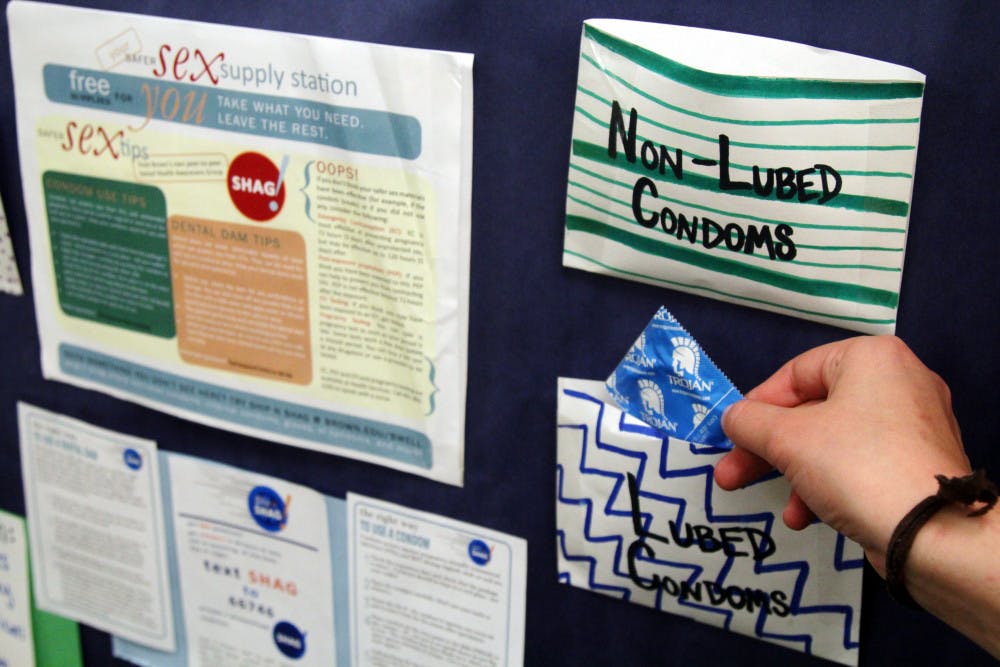BWell Health Promotion has changed its signs and done away with collection tins: All safe sex supplies are now completely free on campus.
In the past, signs asked for donations for safer sex supplies at cost — for example, one external condom cost $0.15 and a dental dam cost$0.50.
Only a few hundred dollars came in per year from donations for the safer sex supplies, which was far lower than the cost, according to Naomi Ninneman, BWell Health educator. The lack of income was one reason to make the supplies free, she added.
“The price obviously was not so high that it would have provided a significant barrier for the majority of students,” said Sexual Health Awareness Group co-coordinator Deborah Pomeranz ’18. But “it’s a good statement to say these things are supplies that all Brown students have a right to and should be able to access free of cost, even if that cost won’t be a barrier.”
“For a lot of people, part of being a student and being a person is exploring their sexuality, and we want people to be able to do that in the most healthy way possible,” Pomeranz added.
The change was made possible in part through free safer sex supplies ordered by BWell through the Rhode Island Department of Health, which offers them to at-risk groups. Since youth are included in that designation, students qualified for free safer sex supplies. BWell has ordered these free supplies before, but the shipments have become more consistent this year.
Another reason for the change was the launch of the Ship n SHAG service in spring 2016 through which students can order free supplies — including internal and external condoms, dental dams, gloves, lube and informational materials on how to use the products — to their campus mailboxes. Since this service is completely free, Ninneman wanted to send a consistent message by making all other campus supplies free as well, she said.
BWell Health Promotion put out a survey to students in 2013 that included questions about barriers to safer sex supplies, Ninneman said. A quarter of respondents said that embarrassment was a large barrier, leading to the development of a free, discreet service — based off of Boston University’s Condom Fairy program — that allows students to avoid taking safer sex supplies in a public space. Cost was not a large barrier to students, according to the survey.
Because of a lack of selection and limited number of safer sex supplies on the doors of Residential Peer Leaders, “a lot of people will just stock two or three kinds of safer sex supplies, whereas with Ship n SHAG you can order any of the things we have available,” said SHAG co-coordinator Susannah Howe ’18, a former Herald senior staff writer.
Students can also text SHAG at 66746 to ask anonymous sex questions, including questions about products they receive through Ship n SHAG. Members of the SHAG team answer the questions with oversight from Ninneman.
Ninneman, Howe and Pomeranz said they see Brown’s efforts as unique and part of a campus culture that cares about removing barriers and making students feel safe and comfortable.
“I think the overall campus culture is really important in informing what our priorities are,” Howe said. “Our approach has definitely changed over time as campus culture and views on campus have changed. We want to make sure we are meeting the needs of Brown students — meeting them where they are regardless of their identity or their experiences.”
Every campus center has responded well to requests to host a safer sex supply station, Ninneman said, adding that they understand the importance of accessible safer sex supplies.
“We know that overall condom availability programs at universities are inadequate,” Ninneman said. “So Brown probably is unusual in the level of accessibility. But we’re not the only ones making these efforts.”
There has been a larger trend on campus toward increasing the accessibility of general health services and products for students on campus — including UCS’ program to provide free tampons in all non-residential on-campus bathrooms and the repeal of Counseling and Psychological Services’ seven-session limit.
“These things — even though we didn’t plan them together — are all really important aspects of students’ health and students’ sexual health,” Pomeranz said.
Students can order supplies from Ship n SHAG or pick them up at campus locations including the LGBTQ Center, the Sarah Doyle Women’s Center, the Brown Center for Students of Color, the bathrooms on the first and third floor of Health Services, the Health Promotion office in Health Services and on the doors of RPLs.





